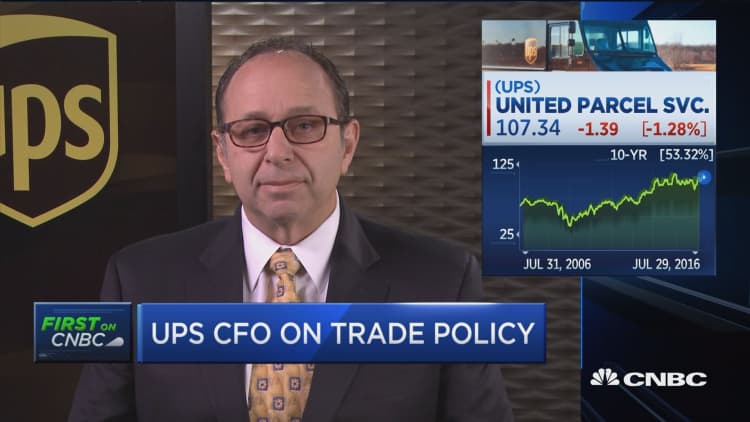
United Parcel Service reported quarterly earnings that were in line with analysts' expectations, and revenues that beat estimates on Friday, helped by international growth and higher delivery volume.
The shipping and packaging company posted second-quarter earnings per share of $1.43, compared to $1.35 a share in the year-earlier period. Revenue for the quarter came in at $14.629 billion against the comparable year-ago figure of $14.095 billion.
Analysts polled by Thomson Reuters expected UPS to post earnings of $1.43 per share on revenues of $14.625 billion.
Shares of the Atlanta-based company fell 0.73 percent in afternoon trading.
UPS reaffirmed its full-year outlook, expecting diluted earnings per share of $5.70 to $5.90.
"We feel very comfortable that the guidance we set earlier in the year is where we'll end for the year," Richard Peretz, chief financial officer at UPS told CNBC's "Squawk on the Street" Friday. "It's international that's outperforming, that's allowing us to maintain the guidance."
International revenue was up 1.1 percent year over year, but currency exchange rates and lower fuel surcharges weighed. Daily export packages increased 3.9 percent, helped by European orders as customers used UPS to benefit from a strong U.S. dollar, the company said.
International operating profit increased 11 percent, the company said, to $613 million for the sixth consecutive quarter of double-digit growth and a record second-quarter level.
U.S. domestic revenue increased 2.4 percent to $9 billion, helped by technology that boosted productivity and lowered costs per unit compared to the same period a year ago, the company said. Average daily package volume increased 2.5 percent.
Like its main rival, FedEx, UPS is often seen as a bellwether of U.S. economic activity.
Peretz pointed to concerns about the global macro economy and Britain's recent vote to leave the European Union.
"The U.K. operation for UPS is very important," Peretz said, adding that they're still committed to the same investments in both the U.K. and Europe going forward. "We're going to be ready regardless of what the new rules are."
Business-to-consumer growth outpaced business-delivery growth by more than five to one, the company said.
"It's been a continuing story reel the last two quarters; business-to-business has continued to soften as the investor production has come down," Peretz said.
Business-to-business shipping does not affect the freight supply business, Peretz said, and UPS is addressing weaknesses by concentrating on middle market customers, the supply chain, and freight areas.
UPS also reported a better-than-expected quarterly net profit in the previous quarter, helped by ecommerce as consumers ordered more goods online.
UPS is challenging a plan by the Central States Pension Fund to cut benefits to its participants, including some UPS employees, because the company does not believe the proposed reduction complies with the law, executives said last quarter.
Peretz told CNBC after last quarter's report that if the U.S. Department of the Treasury approves a proposed Central States pension reduction, UPS would be required to record a charge of between $3.2 billion and $3.8 billion later this year.


